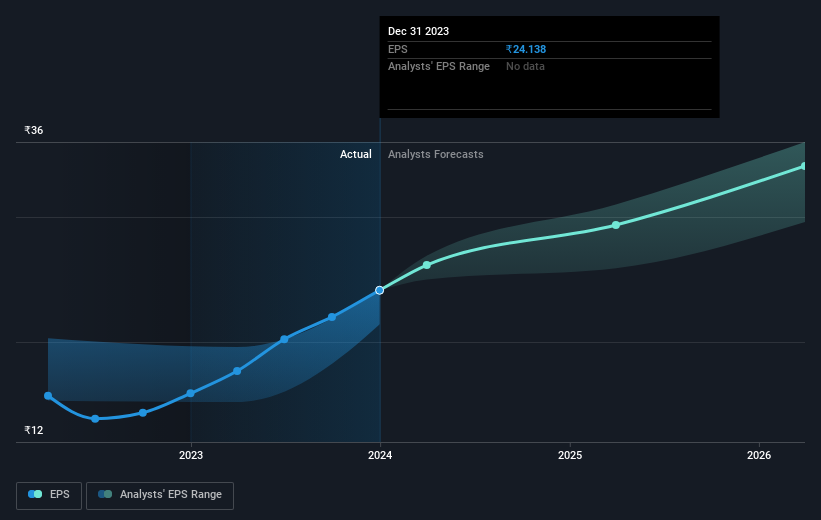Stock Analysis
- India
- /
- Consumer Finance
- /
- NSEI:MANAPPURAM
Earnings grew faster than the favorable 47% return delivered to Manappuram Finance (NSE:MANAPPURAM) shareholders over the last year

It's been a soft week for Manappuram Finance Limited (NSE:MANAPPURAM) shares, which are down 17%. But at least the stock is up over the last year. However, its return of 44% does fall short of the market return of, 44%.
While the stock has fallen 17% this week, it's worth focusing on the longer term and seeing if the stocks historical returns have been driven by the underlying fundamentals.
View our latest analysis for Manappuram Finance
While markets are a powerful pricing mechanism, share prices reflect investor sentiment, not just underlying business performance. By comparing earnings per share (EPS) and share price changes over time, we can get a feel for how investor attitudes to a company have morphed over time.
During the last year Manappuram Finance grew its earnings per share (EPS) by 52%. This EPS growth is reasonably close to the 44% increase in the share price. That suggests that the market sentiment around the company hasn't changed much over that time. We don't think its coincidental that the share price is growing at a similar rate to the earnings per share.
The graphic below depicts how EPS has changed over time (unveil the exact values by clicking on the image).

We know that Manappuram Finance has improved its bottom line lately, but is it going to grow revenue? This free report showing analyst revenue forecasts should help you figure out if the EPS growth can be sustained.
What About Dividends?
As well as measuring the share price return, investors should also consider the total shareholder return (TSR). The TSR incorporates the value of any spin-offs or discounted capital raisings, along with any dividends, based on the assumption that the dividends are reinvested. It's fair to say that the TSR gives a more complete picture for stocks that pay a dividend. We note that for Manappuram Finance the TSR over the last 1 year was 47%, which is better than the share price return mentioned above. This is largely a result of its dividend payments!
A Different Perspective
Manappuram Finance's TSR for the year was broadly in line with the market average, at 47%. That gain looks pretty satisfying, and it is even better than the five-year TSR of 9% per year. Even if the share price growth slows down from here, there's a good chance that this is business worth watching in the long term. It's always interesting to track share price performance over the longer term. But to understand Manappuram Finance better, we need to consider many other factors. Take risks, for example - Manappuram Finance has 3 warning signs (and 1 which is a bit unpleasant) we think you should know about.
If you would prefer to check out another company -- one with potentially superior financials -- then do not miss this free list of companies that have proven they can grow earnings.
Please note, the market returns quoted in this article reflect the market weighted average returns of stocks that currently trade on Indian exchanges.
Valuation is complex, but we're helping make it simple.
Find out whether Manappuram Finance is potentially over or undervalued by checking out our comprehensive analysis, which includes fair value estimates, risks and warnings, dividends, insider transactions and financial health.
View the Free AnalysisHave feedback on this article? Concerned about the content? Get in touch with us directly. Alternatively, email editorial-team (at) simplywallst.com.
This article by Simply Wall St is general in nature. We provide commentary based on historical data and analyst forecasts only using an unbiased methodology and our articles are not intended to be financial advice. It does not constitute a recommendation to buy or sell any stock, and does not take account of your objectives, or your financial situation. We aim to bring you long-term focused analysis driven by fundamental data. Note that our analysis may not factor in the latest price-sensitive company announcements or qualitative material. Simply Wall St has no position in any stocks mentioned.
About NSEI:MANAPPURAM
Manappuram Finance
A gold loan non-banking financial company, provides retail credit products and financial services in India.
Solid track record established dividend payer.


